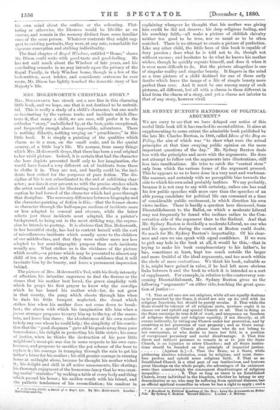MRS. MOLESWORTH'S CHRISTMAS STORY.* Mits. Moi.EswonTri has struck out a
new line in this charming little book, and we hope, one that is not destined to be unfruit- ful. This is really a study of a child's character, but one made so fascinating by the various traits and incidents which illus- trate it, that many a child, we are sure, will prefer it to the orthodox "story," embellished by, at the best, quite exceptional, and frequently enough almost impossible, adventures. There is nothing didactic, nothing verging on " preacliiness," in this little book. It is simply a painting of the qualities which charm us in a man, on the small scale, and in the quaint scenery, of a little boy's life. We assume, from many things which Mrs. Molesworth drops, that there has been a real original to her vivid picture. Indeed, it is certain that had the character she here depicts presented itself only to her imagination, she would have found a very different set of incidents from these to clothe it in. They are not, and hardly could be, the inci- dents best suited for the purposes of pure fiction. The dis- cipline of life is not subordinated to the end of exhibiting char- acter; nor does it ever present us with the precise strokes which the artist would select for illustrating most effectually the con- ception he had formed of the character which had gone through that discipline. The necessary difference between biography and the character-painting of fiction is this,—that the former shows us character through the half-opaque medium of incidents more or less adapted to conceal and obscure, while the latter selects just those incidents most adapted, like a painter's background, to bring out in the most striking way, the expres- sion he intends to portray. It is obvious that Mrs. Molesworth, in her beautiful study, has had to content herself with the sort of miscellaneous incidents which usually occur to the children of our middle-class, and that they were neither more nor less adapted ta her semi-biographic purpose than such incidents usually are. What strikes us is the vividness of the picture which results,—a picture which may be presented to almost any child of ten or eleven, with .the fullest confidence that it will fascinate him by its beauty, and leave a permanent impression behind.
The picture of Mrs. Molesworth's Ted, with his lively intensity of affection, his infantine eagerness to find the flowers or the stones that his mother best loved, the grave simplicity with which he prays his first prayer to know why the cowslips which he has heard his mother wish - for, do not grow in that county, the pang which shoots through him when he finds his little bouquet neglected, the dread which . strikes him when his mother does not come down to break- fast ; the alarm with which his imagination fills him when a jocose stranger proposes to carry him up to the top of the moun- tain, and leave him there ; the absoluteness of his own resolve to help any one whom he could help ; the simplicity of his convic- tion that the "good shopman " gave all his goods away from pure benevolence ; his delight in protecting his little sister; his sense of justice, when he thinks the destruction of his poor little neighbour's meat-pie was due in some respects to his own care- lessness, and proposes to sacrifice the pet scheme of the hour to replace it ; his courage in tramping through the rain to get his father's letter for his mother ; his still greater courage in running home at midnight alone, because he thought his mother wished it; his delight and skill in all active amusements, like skating; his thorough enjoyment of the humorous fancy that he was creat- ing useful" statistics " by making a table of every body and thing which passed his house ; his sudden wrath with his friend, and the pathetic tenderness of his reconciliation ; his candour in
A Christian Child; a Sketch of a Boy's Lffe. By Mrs. Moleswortb. London : Macmillan and 0o.
explaining whenever he thought that his mother was giving him credit he did not deserve ; his deep religious feeling, and his sunshiny faith,—all make a picture of childish chivalry neither too good to be true, nor so usual as to be often matched. There is no attempt to create a picture of perfection. Like any other child, the little hero of this book is capable of fiery passion ; does what he is told not to do, though not without excuse ; and hesitates to do what he knows his mother wishes, though he quickly repents himself, and does it when it is even more difficult to do. But the picture altogether is one of singular reality and singular beauty. It lingers in the mind as a true picture of a child destined for one of those early deaths which leave the image of a life of simple beauty more perfect than ever. And it must be one among many of such pictures, all different, but all with a charm in them different in kind from the charm of a story, and yet a charm not inferior to that of any story, however vivid.






































 Previous page
Previous page